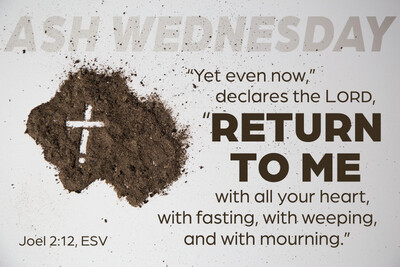Ash Wednesday
In today’s gospel Jesus cautions us against public acts of piety—on the one day of the year we leave worship with a visible smudge on our foreheads, reminding everyone we see that we have been to church. What are you supposed to do, wipe the ashes off before stepping outside? Do you leave them on only to have the cashier at the grocery store say, “You’ve got something on your forehead”?
Of course Jesus does not tell us to refrain from all acts of public piety. What Jesus seems concerned with is the why, not the what. Why do you pray in public? Why do you give alms? Why do you fast? If appearing faithful is a way to build yourself up before others, then it is not faithfulness but hypocrisy. On the other hand, if praying over a meal in a restaurant is something you do because praying at meals is part of your faith, by all means bow your head and pray.
As the season of Lent begins each year, God’s people are invited to take on three great disciplines: prayer, fasting, and alms-giving. You hear the invitation to prayer, fasting, and alms-giving in the reading from Joel. Jesus’ words in the gospel remind us that our acts of faithfulness always come as a response to God’s gifts. Remembering this gives a note of humility to all we do. Piety is not something to brag about. Piety is not something to be proud of. Piety is but acknowledgment of the one who first gave us everything.
Finally, Paul makes it clear, as if there were ever any question: we only become righteous in Jesus. We know grace only because Jesus becomes our sin. This is the grounding for everything we do throughout the holy days of Lent.

